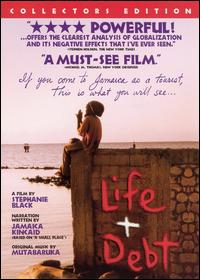Synopsis
Life and Debt is a 2001 United States documentary film directed by Stephanie Black about the economic and social situation in Jamaica after globalization, specifically the impact of International Monetary Fund (IMF) and the World Bank's policies. It starts with the essay "A Small Place" by Jamaica Kincaid. The IMF loans were conditional on structural adjustment policies, which required Jamaica to enact major economic reforms, including trade liberalization, privatization, and deregulation. Reforms were not successful and left Jamaica with $4.6 billion in debt.
The film features a number of interviews with former Jamaican Prime Minister Michael Manley, in which he critiques the system of International Financial Institution loans. He is particularly critical of required structural adjustments as an attack on the sovereignty of many former colonial nations and suggests the system is akin to imperialism or neocolonialism. He also criticizes the Jamaican Free Zones as U.S.-subsidized sweatshops. The film itself interviews several of the free zone workers.
Reception
Roger Ebert, a film critic for the Chicago Sun-Times , gave the movie a three out of four-star rating and described it as "a harsh indictment, but persuasive". [1]
On Rotten Tomatoes the film has an approval rating of 90% based on reviews from 42 critics. [2]
On June 15, 2001, Stephen Holden of The New York Times , [3] wrote a review titled "ILM REVIEW; One Love, One Heart, Or a Sweatshop Economy?", in which he describes the film as a powerful documentary. He says that "The movie offers the clearest analysis of globalization and its negative effects that I've ever seen on a movie or television screen".
On February 26, 2003, Jamie Russell from the BBC gave it a four out of five-star rating and described the movie as brilliant. She explains that Stephanie Black's hits toward the tourism industry and lack of options to change the situation leaves audiences with nothing more than simply being angry about everything. [4]
On March 25, 2003, Andrew Pulver of The Guardian gave it four out of five stars. He stressed the importance of the movie and explained that anyone with any interest in globalization should watch it. He describes it as "a detailed, poignant examination of Jamaica's parlous economic plight". [5]
This page is based on this
Wikipedia article Text is available under the
CC BY-SA 4.0 license; additional terms may apply.
Images, videos and audio are available under their respective licenses.
